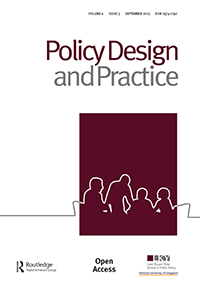Research for impact: three keys for research implementation
IF 2.6
Q1 PUBLIC ADMINISTRATION
引用次数: 1
Abstract
Abstract Impact is essential to research, policymaking and implementation. Yet impact is often misunderstood or poorly defined. For public policy scholars, concerns about impact exist largely on two planes. On one level scholars seek to understand the impacts of policy interventions. On a second level scholars aim for their public policy research to generate real-world impact. These two concerns – the “what” and the “how” of research – are often treated separately. In this article, we argue that it is worthwhile joining up these concerns about impact. This is possible, we suggest, through a combination of logic models and a novel rethink of the usual “pathway to research impact”. The article introduces two research co-design tools aimed at improving the likelihood of achieving research impact, while also improving understanding of those impacts: an integrated knowledge translation (IKT)-informed logic model and an implementation science (IS)-derived Pathway to Impact. We draw on a multi-year research co-creation project to develop the Infrastructure Engagement Excellence (IEE) Standards for Australia’s $250 billion infrastructure sector. This co-creation project illustrates the development of the logic model, Pathway to Impact and consequent research co-design process. Together, these tools can support policy scholars’ efforts to produce impactful research while also creating better understanding of policy and practice impacts, and how to achieve them. We conclude that genuine and robust research co-design requires researchers to commit not only to undertaking research with rigor, but also a willingness to dedicate thought and effort to the relationship between what research activities are carried out and how those processes can advance policy and practice outcomes and impact.影响研究:研究实施的三个关键
摘要影响对研究、决策和执行至关重要。然而,影响往往被误解或定义不清。对于公共政策学者来说,对影响的担忧主要存在于两个层面。在一个层面上,学者们试图理解政策干预的影响。在第二个层面上,学者们的公共政策研究旨在产生现实世界的影响。这两个问题——研究的“内容”和“方式”——通常被分开对待。在这篇文章中,我们认为,将这些关于影响的担忧结合起来是值得的。我们认为,通过逻辑模型的结合和对通常的“研究影响途径”的新颖反思,这是可能的。本文介绍了两种旨在提高实现研究影响的可能性,同时提高对这些影响的理解的研究共同设计工具:一种是综合知识翻译(IKT)知情逻辑模型,另一种是实施科学(IS)衍生的影响途径。我们利用一个多年研究联合创建项目,为澳大利亚2500亿美元的基础设施行业制定卓越基础设施参与(IEE)标准。这个共同创建项目说明了逻辑模型的发展、影响之路以及随后的研究共同设计过程。总之,这些工具可以支持政策学者进行有影响力的研究,同时也可以更好地了解政策和实践的影响,以及如何实现这些影响。我们得出的结论是,真正而稳健的研究联合设计要求研究人员不仅要致力于严谨地开展研究,还要愿意将思想和精力投入到开展的研究活动与这些过程如何推进政策和实践结果及影响之间的关系上。
本文章由计算机程序翻译,如有差异,请以英文原文为准。
求助全文
约1分钟内获得全文
求助全文
来源期刊

Policy Design and Practice
PUBLIC ADMINISTRATION-
CiteScore
10.30
自引率
4.30%
发文量
19
审稿时长
13 weeks
期刊介绍:
 求助内容:
求助内容: 应助结果提醒方式:
应助结果提醒方式:


